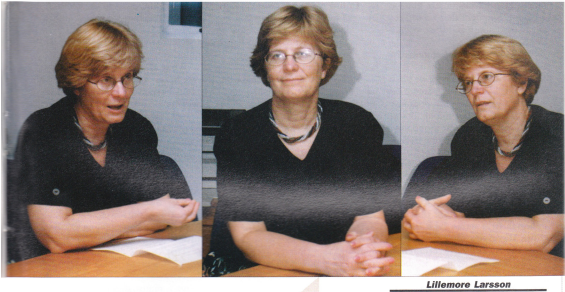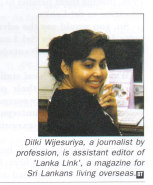Q: What is the value of your company’s investment in Sri Lanka?
A: The plan is for Telia to invest around US$40 million in equity. But that is not the total investment, other partners would bring in money and parts of it would be borrowed so if you look at the total investment, it is around US$200 million.
What was the impetus to bring a major project like ‘Telia’ to Sri Lanka?
I think you may be aware that we are the main telecommunication company in Sweden and we have been investing in other countries for the last 5 to 6 years. In all countries now, liberalisation is setting in. And although we were the first in Sweden, the situation has changed and we have a lot of competition now. The best way to keep going therefore, is to find new markets and that’s what is happening in the world today. We started
to look around and to invest in countries closer to Sweden. We went to the Baltic state, to Russia and to Eastern Europe, but after that we started to look at areas where there was a real need for telecommunication, for example this part of the world, where the penetration of telephone lines is very low. In fact, the initiative to come to Sri Lanka came from the Metropolitan Group who came to Sweden and told us about the opportunities in Sri Lanka – that’s how it all started.

What is the extent of Metropolitan’s involvement with Suntel?
They own 21% of the company. Metropolitan and Telia formed this joint venture together with the National Development Bank (NDB) and we then started bidding for the licence which we have succeeded in obtaining.
How does Sri Lanka rate in comparison with other countries? For instance, did you find dealing with Sri Lankan bureaucracies easier than that of other countries, especially those which were still under Soviet influence and would have been resisting privatisation?
Yes. Just like it was here. From our perspective we think Sri Lanka is a good size for us because we don’t come from a very large country ourselves, and we have found that people are very well trained here. As far as bureaucracy is concerned, we have found it much more difficult in other countries such as India or China, for example. It is much more easy to be a newcomer here. In India, the bureaucracy is ten times worse.

Would you like to give an example?
If we need to discuss something over here, it is always possible to meet the Board of Investment (BOI) or the Ministry by appointment and sort out the matter but to do the same in India is much more complicated i.e., you need to get dates sorted out and then the Delhi Government has to be involved etc., as I see it, things are much more difficult there.
What is the size of your investment in India?
We have two investments there. One in mobile service and one in paging and each of those investments are about the size of our investment here. We have around US$200 million in each of them. And we commenced these two ventures also in December 1996, making them parallel to our operation in Sri Lanka.
So, you would say the advantages in investing in Sri Lanka far outweigh the disadvantages?
Definitely I think so.
What about your local staff are you happy with their performance? How do they compare with their Swedish counterparts on executive and non-executive levels?
Mr Jan Campbell, who is heading our Suntel operation here, has told me he is very satisfied with his staff. He says it is easy to get hard working, motivated people here who have good skills as a base. As for comparison with Swedish employees, I am sure they are equally good. Of course, people here are not skilled in telecommunications but their basic skills are as good as we wish. That is why we have to train them. Once they are trained I am sure they would be as good as any.
Could you tell us what your market share is?
Up to November 1996 it was Sri Lanka Telecom (SLT) one hundred percent. We have still not established a market share as such in the two months we have been in operation but our goal is to obtain 25% of SLT’s market.
I think it is also important to establish that we are building a normal basic telephone network. Some people think we are another mobile operator. This is not so. SLT was the only one to supply this service so far, but we will also supply normal land telephones. Of course, we would use a different technology and introduce new services later on, such as data, internet etc., but we are not an- other mobile operator.
Is Lanka Bell in direct competition with you?
Yes. Two licences were given out by the Government at the same time. One to us and one to them. But they are not in commercial operation as yet.
How will you deal with the competition?
We think competition is good. It is good for the market, it is good for the companies because it forces companies to do better. We are not afraid of competition, in general terms it is good.
And it is also good for Sri Lanka because it will generate more interest in the country which is much needed. Of course, the competition will be there when we meet potential customers but we are quite confident that we will get our market share and they will get theirs.
What is your market share in Sweden?
At the moment I think we have something like 60% but I cannot be sure. We were the only operator for a long time but about fifteen years back we lost our monopoly.
For how long did you have a monopoly status?
Well, the company started a hundred years back. In the beginning it was a lot of small operators and then it became one company.
So, this is the time that telephones first came into operation? Have you anything to do with the Swedish Government?
Yes. You are right, it is about the time telephones came into being. Telia is owned by the Government. We were somewhat like your SLT. But then liberalisation came and now we have a lot of operators in Sweden. We too are more like a company now as I am sure SLT would also become in the future.
How fast do you give a telephone connection in Sweden?
I am sure we give it in a couple of days but I don’t have the statistics with me right now. We don’t have a waiting list in Sweden we have a penetration as it is called, of 70%. That means 70 out of 100 has a telephone line.
How fast would it be here?
At the moment our network covers only up to Central Colombo. And someone applying for a phone within that area would get connection within three days.
When do you plan to extend to rural areas where telephone facilities are an absolute necessity?
We have a monthly expansion plan. This Spring we will cover Greater Colombo upto Kandy and some areas down south, and gradually expand to other areas.
Could you tell what plans Suntel has for the future?
Our licence tells us we have to be in all the regions of the country before the year 2000.
Even Jaffna?
Ah! No. Except Of course troubled areas. Although this too might be a possibility by the year 2000. But we plan to introduce new types of services into our network such as data, internet access, voice mail etc. and we also intend to maintain the same standards as we do in Sweden – bring in new fittings. That is our overall plan.
What other operations do you have in the region?
In India, we have a Cellular Company which covers the areas Karnataka and Andhra Pradesh, a paging company which will cover 12 of the states, that would be almost all India. We are just starting the commercial service both in our paging company and in our mobile company. We have an operation also in the Philippines.
Do you intend to further expand in the region?
Yes. It is part of Telia’s strategy to expand to new markets, even outside Asia. But I work within the Asian region. We are also involved in setting up an operation in Hong Kong.
What is the size of Telia itself?
Telia has 35,000 employees. And the company has an annual budget of 1.2 billion Swedish Krones for investment in new markets outside Europe, which is around 10 billion rupees.
What do you think of our economic climate in terms of foreign investors coming into Sri Lanka?
I feel that the atmosphere is very good here for newcomers. Of course, the economy could be better than it is. I hope it will be better. But we are quite happy to be here. We follow a certain procedure before deciding to go into a country to invest. And the decision at home was that we believe in Sri Lanka and we thought the business climate here had definite possibilities.
What about the business culture here? Are there many differences in the way things are done over here and in Sweden?
Yes, there are differences. If you compare the labour costs, they are much lower here which means we can do more things manually than we would in Sweden. Here we have drivers, tea boys, peons etc., we don’t have all that in Sweden we have to do those things ourselves.
Is that advantageous or disadvantageous?
That’s a very difficult question. I think it is interspersed with both. As for the business culture itself, I think a major difference here is that the local business community operates on a personal basis. For instance, we could never have come here if we did not have a local partnership like Metropolitan and NDB. This is not more difficult but a little more different. I feel in Sri Lanka you need to know people to do business with them. In Sweden we do business with people we do not know. That’s what I feel.



